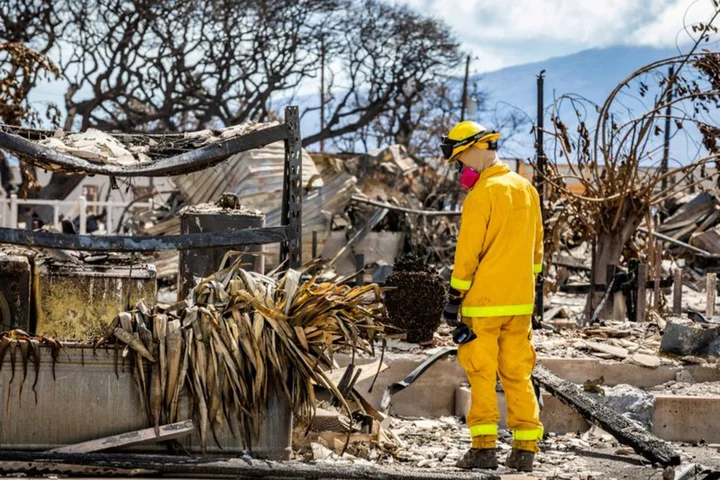By David Morgan
WASHINGTON U.S. federal wildland firefighters are facing a huge potential pay cut this autumn that lawmakers in Washington warn could cause thousands to walk off the job, due to a feud among Republicans in Congress over federal spending.
That could mean dire consequences for 16 U.S. states, mostly in the West and Southwest, where about 16,600 firefighters were battling more than 90 large fires across nearly 630,000 acres as of Tuesday, National Interagency Fire Center data show.
The standoff between lawmakers continues as the Hawaiian island of Maui struggles to recover from a massive blaze that killed at least 115 people and Canada's British Columbia province is also being ravaged by fire.
"We're going to have these people out fighting wildfires for us in this country. And their pay could be cut by 50%," said Representative Mike Simpson, an Idaho Republican who chairs the House Appropriations Subcommittee on Interior, Environment and Related Agencies.
"You're going to have ... wildfire fighters out here that - hell, I don't know - they might walk off the job with somebody who's going to cut their pay 50%," he told Reuters.
The federal government employs an estimated 18,700 wildland firefighters. Republicans and Democrats in Congress agree that failure to protect their pay could lead to a mass exodus at a time when climate change is fueling more severe wildfires over longer seasons.
At issue is a $60 million supplemental funding request from Democratic President Joe Biden, which would protect federal wildland firefighter pay through December, if Congress can avoid a government shutdown when current funding expires on Sept 30.
'HOSTAGE TO CONGRESSIONAL INFIGHTING'
Biden raised wildland firefighter pay to a minimum of $15 per hour in 2021 and later signed into law a $1 trillion bipartisan infrastructure bill, which provided annual pay raises of $20,000 or 50% of a firefighter's base pay, whichever was smaller.
The pay hikes from the infrastructure bill are expected to run out around Sept. 30, according to the White House.
"Firefighters cannot be held hostage to congressional infighting," said Lucas Mayfield, president of the advocacy group Grassroots Wildland Firefighters. He warned that a pay cut could not only lead firefighters to walk off the job this year but make an already challenging recruitment environment more difficult in 2024.
"People are going to be looking for outside opportunities to have a livable and plannable income," Mayfield said.
The Democratic-led Senate appears poised to begin moving forward on bipartisan funding.
But it is unclear whether the Republican-controlled House of Representatives can overcome infighting between hardline and centrist Republicans to enact spending legislation on time.
Wildfires have burned just under 1.8 million acres in the United States this year, according to data from the National Interagency Fire Center. The cost and danger of U.S. wildfires has been growing in recent decades.
More than 10 million acres were affected in 2015 and 2017. Last year, the cost of suppressing wildfires across 7.6 million acres surpassed $3.5 billion, according to the center.
"Failure isn't an option," said Representative Joe Neguse, a Colorado Democrat who is working to address the pay gap with a bipartisan coalition of House and Senate lawmakers.
"Now is not the time ... to be engaging in this kind of the political gamesmanship around something as important as the livelihood of our wildland firefighters," he told Reuters.
Neguse and Senator Kyrsten Sinema, an independent from Arizona, have introduced legislation in their respective chambers that would avoid the pay cliff and authorize future pay increases for wildland firefighters.
Salary authorization would need to be included along with funding for firefighter pay in a short-term stopgap measure, special supplemental legislation or annual appropriations, depending on what Congress can pass by Sept 30.
(Reporting by David Morgan; Editing by Scott Malone and Alistair Bell)

